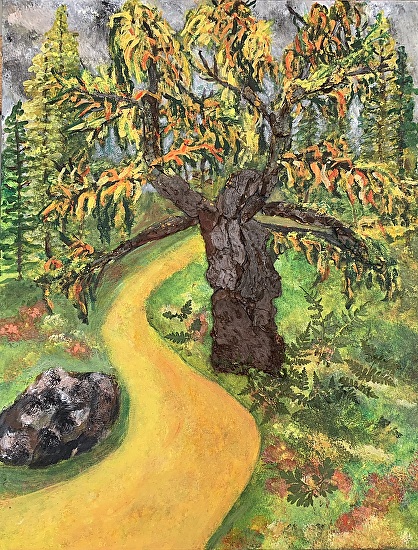
It is easy to be fooled when passing a Larch tree during the summer. They grow cones and have soft two-inch needles bundled like a pine. Each fall, the needles turn a golden yellow before dropping their leaves. They are among the first deciduous tres to grow new needles (leaves) each spring.
Take the Hard Road
A few days ago I watched a TV show where a high school athlete was given a scholarship opportunity on the track team at UCLA. Acceptance rested on her willingness to move far away from home, leave friends behind, and forgo the usual social activities of an incoming freshman. To succeed, along with academics, she would have to devote herself to her sport. The twelfth grader wasn’t sure she wanted to make such a sacrifice, thinking of how difficult it would be to travel along such a singularly focused path.
Feeling conflicted, she spoke to her boyfriend, asking him what to do. And, though he didn’t want her to leave, without hesitation, he told her she had to go for it. “I used to wait tables and do odd jobs,” he said. “I had no direction and never thought about my future. Now I’m that I’m in an EMT course in training to be a first responder, I find it hard—but, it feels so right. I’m not sure why, but the work is fun. It feels great to have a purpose. Take the hard road to fulfill your dreams.”
It was sound advice from a young man and it holds for people no matter what their age. Walking on a purposeful path, sacrificing playtime to do something meaningful, though not easy, is likely to be interesting. The boy’s comment made me remember my childhood passion to be a world-famous prima ballerina and my college desire to travel to exotic places as an anthropologist. It was easy to spend hours practicing dance and studying primitive peoples. Absorbed in what I was doing, I was happy and never thought of it as hard work. As a child, I spent hours in my basement practicing pliés and pirouettes. When older, my time was spent in the library reading about social, political, religious, economic, and childrearing customs in tribal societies. Though I never achieved either career intention, having goals to pursue enriched my student days.
I still enjoy dancing and continue to do so. Exercise became embedded in my daily routine and it helps me stay healthy and flexible. Anthropology taught me how to think and analyze different cultures. I learned that every society has customs and beliefs to answer questions about human existence and they all have ways of organizing their communities. Anthropology turned me into a more tolerant person by realizing that human beings see the world through different lenses. It made me forever curious.
That I eventually pursued a career with museums was not a far reach from having been wrapped up in Indian and African cultures. But the road to success as a science museum director was unexpectedly hard. I had a lot to learn with bumps in the road that, at times, caused me to trip and fall. Thankfully, my earlier studies and training remained with me and served as a buffer going forward. The sum of my effort and failures were a help every time I took a fork in the road.
Those who walk the hard road feel alive. Today’s political situation, confused ethical considerations, pandemics, and global warming make the path forward appear dangerous. Yet, now more than ever, it is important to ask what issues are important and what you are going to do about taking them. No one can afford to sit back and wait for “others” to come up with miracle cures. It won’t happen. But have heart. Taking on a cause adds purpose to each day. Setting goals and following them through with passion will grow your inventory of wisdom and keep you feeling energized and complete.
